FRENCH COURT CHARGES VICHY HEAD PÉTAIN WITH TREASON
Paris, France • July 23, 1945
Following the military defeat of France by Nazi Germany in June 1940, World War I hero Maréchal (Marshal) Philippe Pétain proclaimed a new French government on July 10, 1940. Pétain held the title of “President of the Council” instead of President of France. His government, which accorded him extraordinary powers, was officially called the French State, L’État français. Unofficially, it was called Vichy France after the resort town where Pétain and the National Assembly met. Paris, the French capital, remained in German-occupied Northern France, zone occupée. Vichy governed the zone libre, or “Free Zone,” as the southern rump of France was called (see map below), but it had administrative authority in both zones, subject to German interference and veto in the zone occupée. Even in the zone libre, where Pétain in theory exercised full executive power under the terms of the Franco-German armistice, the Germans could interpret the armistice any way they liked.
When the Allies landed in Vichy-administered North Africa in November 1942 (Operation Torch), German and Italian troops moved in to occupy the rump French state. On August 24, 1944, after four years of Vichy collusion in the occupation of their country, a Free French armored division under the command of Gen. Jacques Philippe Leclerc de Hauteclocque, which had landed on Utah Beach in Normandy at the top of that month, liberated the French capital. The next day Free French head Gen. Charles de Gaulle, who had set up a provisional government (Gouvernement provisoire de la République française) on French soil during the Normandy Campaign, entered Paris and within a week had installed his government in the liberated capital.
De Gaulle soon pressed a program of national reconciliation on his countrymen by pushing his myth of France as a nation of united resisters betrayed by a handful of traitors. It was a story that served the purposes of a nation struggling to reinvent itself on the flipside of military defeat, a brutal occupation, and a virtual civil war. The myth was a way for French men and women to hold their heads high in the postwar period. But the truth was ugly, tragically ugly. Most French people, especially those in military and government service, initially supported the reactionary Pétain regime and the Maréchal’s “contract with the devil,” i.e., Nazi Germany. During the Vichy years authorities received a million letters wherein Frenchmen denounced other Frenchmen, particularly if the others were Jews—that’s 1,500 denunciations a day! Most often the letters were signed “un bon Français.” Authorities paid informers on the spot if the denounced person or persons turned out to be Jewish, with money pried from the victim(s). That said, over 300,000 suspected French collaborators—including some of the more than 40,000 men who had joined Vichy’s paramilitary force Milice française (or simply Milice) and the 200–220 French policemen who joined the Paris-based Brigades spéciales, scourge of the French Resistance—were turned over to various courts of justice. Some 38,000 were given prison sentences and more than 7,000 were condemned to death. Of those condemned, just 764 were executed. At least 4,500 more persons were summarily put to death by tribunals set up by the Resistance as resistants themselves settled old scores outside the established court systems.
On this date, July 23, 1945, former Vichy head Pétain appeared before the French High Court of Justice and three weeks later was sentenced to death. De Gaulle commuted the 89‑year-old’s sentence to life imprisonment. Pierre Laval, Prime Minister of Vichy France, and Milice chief Joseph Darnand were executed. Many collaborators—for instance police who had organized raids to capture Jews and others considered “undesirables” by the Germans in both French zones—soon resumed official duties. In 1955 amnesty fever broke out and ten years later all jailed French collaborators were free persons. The crimes and embarrassing moral compromises made by many French men and women during the German occupation—a morally complicated time for sure—were swept from national memory.
![]()
Partitioned France and Prominent Vichy French Collaborators
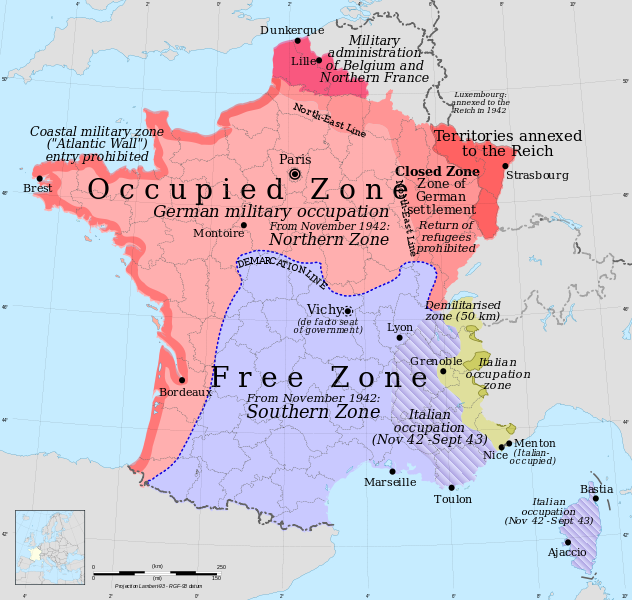 |
Above: In just six weeks in May and June 1940, France, a world power, descended into a subject nation, partitioned between German and Italian occupiers and Vichy French collaborators. The German-occupied zone included the northern three-fifths of France and a strip of land running down the whole Atlantic coastline from Belgium to Spain. The German zone contained most of France’s population, industrial wealth, and best vitacultural (wine-growing) areas. The unoccupied zone (Free Zone) in South-Central and Southeastern metropolitan France was the poorest part of the country and was the headquarters of Marshal Pétain’s Vichy government. After Allied landings in French Northwest Africa in November 1942, German and Italian troops swept in to occupy Vichy France (renamed the Southern Zone) until killed, captured, or expelled from most parts of France between June and August 1944.
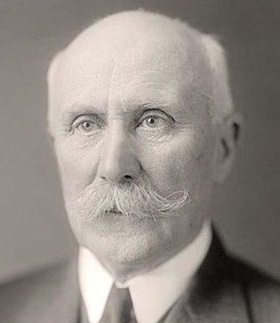 | 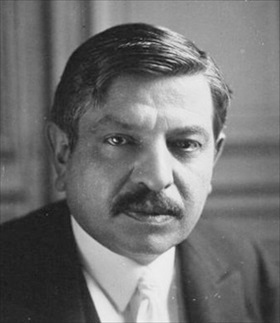 |
Left: Philippe Pétain (1856–1951) was a French general who reached the distinction of Marshal of France, later authoritarian Chief of State of Vichy France from 1940 to 1944. Over the years the right-wing Pétain and his Vichy minions collaborated ever more closely with their German masters, deluding themselves into believing that if they showed Adolf Hitler they were “good collaborators” German occupation would end sooner rather than later and France would therefore enjoy a favorable position in the new European order dominated by Nazi Germany. Pétain’s wartime actions resulted in his postwar conviction for treason (by a one-vote majority) and death sentence. Gen. Charles de Gaulle, who was President of the Provisional Government of the French Republic, commuted the sentence to life imprisonment due to Pétain’s advance age and his military contributions in World War I. Pétain was exiled to an island prison off the French Atlantic coast, where he died at the age of 95.
![]()
Right: Pierre Laval (1883–1945) was four-time Prime Minister of France, twice serving the Vichy regime as head of government. An admirer of totalitarian government, Laval embraced the cause of fascism, the destruction of democracy, and the dismantling of the democratic Third Republic. An especially vicious Nazi collaborator, he acquired the nickname “Black Peter.” He signed orders sanctioning the deportation of foreign Jews from French soil to Nazi death camps. On September 7, 1944, what was left of the Vichy puppet government took sanctuary in Sigmaringen in Southwestern Germany. After falling into U.S. hands, Laval was turned over to the French government in late July 1945. Tried for treason and violating state security, he was convicted and sentenced to death. After a failed attempt at suicide (the cyanide had lost its full potency), Laval was executed, half-conscious and vomiting, by firing squad on October 15, 1945.
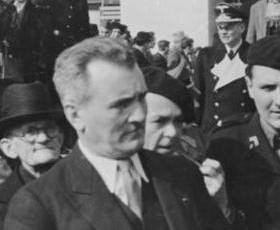 | 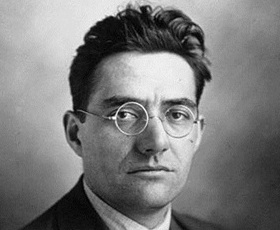 |
Left: A far-right veteran from the First World War, Joseph Darnand (1897–1945) founded a militia in 1941 that supported Philippe Pétain and Vichy France. Starting in January 1943 he transformed the organization into the notorious Milice française, whose members regarded themselves as above the law, looted, robbed, and menaced the population at large. In October 1943 Darnand took an oath of loyalty to Hitler and received the rank of Sturmbannfuehrer (major) in the Waffen-SS (ruthless armed wing of the Nazi Party’s Schutzstaffel, or SS for short). In December 1943 he became head of police and later secretary of the interior. Darnand expanded the Milice and by 1944 it had over 35,000 members, of which one in six was a woman. After the Allies’ Normandy breakout and their breakneck advance through German-occupied France, Darnand joined Pétain’s government in Southwestern Germany in September 1944. The next April he fled to Northern Italy, where he was arrested and hauled back to France. Tried and sentenced to death, he was executed by firing squad on October 10, 1945, five days before his boss, Pierre Laval, met the same fate.
![]()
Right: Jacques Doriot (1898–1945) founded the ultra-nationalist, pro-fascist Parti Populaire Français (PPF) in 1936. Doriot became a staunch supporter of the Nazi occupation of Northern France in 1940. He moved to Paris, where he espoused pro-German and anti-Communist propaganda on Radio Paris. In 1941 he co-founded the Légion des Volontaires Français (LVF), a French unit of the German Wehrmacht (armed forces). The LVF saw active duty on the Eastern Front. When the unit was all but destroyed, Doriot fought in the Wehrmacht and was awarded the Iron Cross in 1943. After France’s liberation the PPF was involved in conducting intelligence and sabotage activities by supplying men whom the Germans dropped by parachute into liberated France. Doriot was killed in late February 1945 when his car was strafed by Allied fighter aircraft.
Treason Trials of Marshal Philippe Pétain and Pierre Laval (in German; Interesting for the Lineup of Prosecution Witnesses)
![]()

 History buffs, there is good news! The Daily Chronicles of World War II is now available as an ebook for $4.99 on Amazon.com. Containing a year’s worth of dated entries from this website, the ebook brings the story of this tumultuous era to life in a compelling, authoritative, and succinct manner. Featuring inventive navigation aids, the ebook enables readers to instantly move forward or backward by month and date to different dated entries. Simple and elegant! Click
History buffs, there is good news! The Daily Chronicles of World War II is now available as an ebook for $4.99 on Amazon.com. Containing a year’s worth of dated entries from this website, the ebook brings the story of this tumultuous era to life in a compelling, authoritative, and succinct manner. Featuring inventive navigation aids, the ebook enables readers to instantly move forward or backward by month and date to different dated entries. Simple and elegant! Click 











